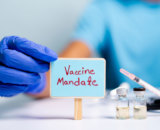Negotiations on the next coronavirus response bill begin in earnest this week and pressures to act includes the expiration of expanded unemployment benefits July 31, the planned start of the congressional recess soon after, and economic and health care needs created by the coronavirus.
Most observers think the package will pass before the August recess and is likely to be the last major piece of legislation Congress considers before the election in November.
Senator Mitch McConnell is expected to release the Senate Republican proposal later this week. The emerging Republican proposal is expected to be in the $1 trillion range and will serve as a counteroffer to the $3 trillion House-passed HEROES Act.
Several media outlets have reported that the Administration has upended talks over the relief bill by trying to block billions of dollars for states to conduct testing and contact tracing, potentially delaying the release of the Senate GOP proposal.
Below is a quick overview of the issues NATSO is tracking most closely as the U.S. legislation progresses:
Paycheck Protection Program (PPP) – The next COVID bill will likely include various modifications to the PPP program, including more money and potentially more flexibility, but it is unclear what it will look like. Treasury Secretary Steven Mnuchin said that he thinks the businesses hardest-hit by the coronavirus pandemic should be able to receive a second round of assistance under the Paycheck Protection Program. About $130 billion of funds in the program remain available. NATSO is pushing for a modest reform to ensure that all restaurants within travel centers can access PPP loans on the same basis as restaurants not located within truckstops.
Patriot Pay / Unemployment -- GOP lawmakers have discussed proposing the federal supplemental unemployment benefit be cut from an additional $600 per week to between $200 per week and $400 per week. The lower number is viewed as the likelier outcome in their bill, although negotiations are fluid and details remain in flux. House Democrats have already passed legislation extending the CARES Act’s enhanced $600/week unemployment program through January. Democratic leaders and their staff have not ruled out a compromise on this issue but have stated that they think the current program is working and has been “an essential part” of the economy’s recovery so far.
The Chamber of Commerce said in a letter to lawmakers last week that it would back a policy offering up to $400 in extra weekly benefits to help replace 80 percent to 90 percent of workers’ prior wages, and less for states that are unable to update their systems to calculate each worker’s weekly earnings.
NATSO is following this issue closely. The New York Times reported recently that most retailers that had temporarily raised employee wages at the outset of the pandemic have rolled back those pay hikes. According to that article:
- Stop & Shop ended a 10 percent pay raise it had given its workers.
- Amazon, Kroger, and Albertsons have also ended hourly pay raises, though some of them continue to give out bonuses.
- ShopRite said it planned to end its $2 per hour raise early next month.
- Walgreens has not announced plans to provide any additional bonus beyond the $300 bonus it gave in early April.
- Kroger ended its $2 per hour pay raise but recently paid bonuses to employees.
- Whole Foods (owned by Amazon) ended the additional $2 per hour raise it provided its employees and has opted to give out bonuses (as high as $500 last month).
- Target paid its workers an additional $2 per hour through July 4 and then gave all its workers a $200 bonus. (It also announced it was raising its starting wage to $15 per hour, though had planned to do that before the pandemic.)
- Walmart paid special bonuses in April and late last month and is planning another round for September. It did not raise hourly pay.
Liability
Liability protection for businesses is expected to be in the COVID relief package that Congress is likely to pass in the coming weeks. Senate Republicans recently released their liability principles, which are summarized below. These principles will be subject to negotiations with Democrats in the coming days.
- Creates an exclusive federal cause of action for personal injuries arising from coronavirus exposure allegedly caused at a school, college, charity, church, government agency, or business.
- Defendants are liable only if they failed to make reasonable efforts to follow applicable public-health guidelines and committed an act of gross negligence or intentional misconduct.
- Imposes procedural rules including concurrent federal jurisdiction over all claims covered by the statute, heightened pleading standards, clear-and-convincing-evidence burden of proof, and damages caps.
- Cause of action and procedural rules sunset the later of the end of the COVID-19 PREP Act Declaration or 2024.
- Protects employers from liability and from agency investigation under federal labor and employment laws for actions taken to comply with stay-at-home orders and other public-health guidance.
- Protects employers from liability for injuries arising from workplace coronavirus testing.
- Provides that a business who provides training, PPE, or other assistance to an independent contractor or to a franchisee’s employee does not convert the independent contractor or franchisee’s employee into the employee of the person providing the training, PPE, or other assistance.
- Amends the WARN Act of 1988 to provide employers flexibility in light of the sudden economic dislocation caused by the coronavirus.
Subscribe to Updates
NATSO provides a breadth of information created to strengthen travel plazas’ ability to meet the needs of the travelling public in an age of disruption. This includes knowledge filled blog posts, articles and publications. If you would like to receive a digest of blog post and articles directly in your inbox, please provide your name, email and the frequency of the updates you want to receive the email digest.
